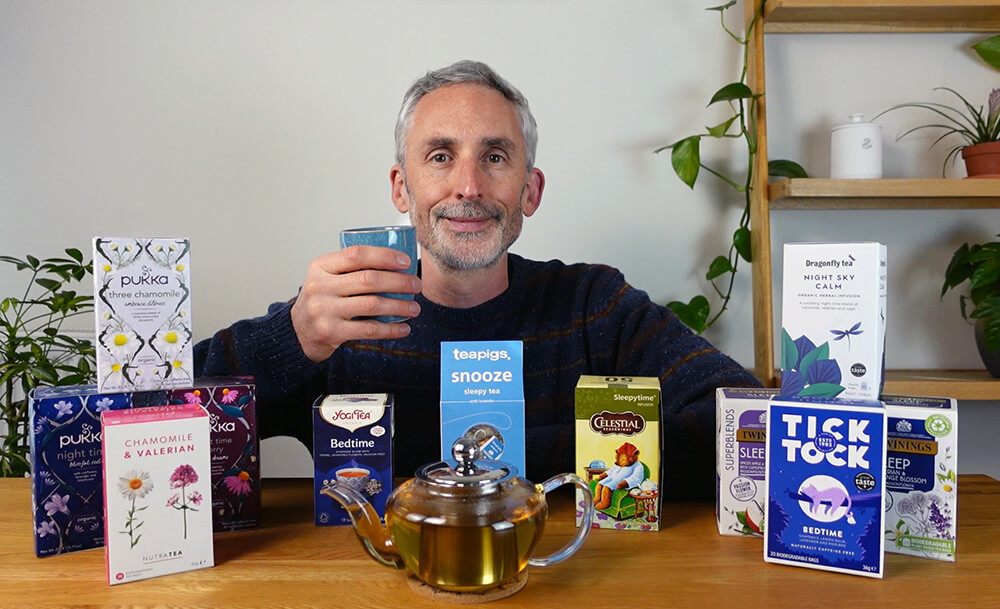
In the photo above, you can see some of the herbal teas I bought and tested during the last month. If the saying ‘you are what you eat’ is to be believed, I must be at least 30% chamomile and valerian by now!
If you spend much time with us Brits, you’ll soon discover that an important step in dealing with many of life’s problems is to put the kettle on.
As well as being a reliable friend that accompanies us in both the good and the bad times, can tea really help us sleep better though? Or is it just the placebo effect and taking some time out to relax that does the trick?
Personally, no herbal tea I’ve ever tried has magically knocked me out if I wasn’t already tired. In reality, I choose to drink them for three main reasons: they don’t contain caffeine, they taste good, and I find they mark a moment in the evening when I intentionally decide to slow down and start unwinding before going to bed.
In this article, I’ll start off by sharing my thoughts on twelve ready-made teas, which includes some classics I’ve drunk for many years. After that, I’ll take a look at the evidence they work, along with some reader suggestions of even more teas to try.
Contents
- 12 teas I bought and tried
- What evidence is there that tea might help you sleep?
- Teas recommended by previous readers
12 teas I bought and tried
How I decided on this list
I’ve been drinking some of these teas for several years anyway, so they were easy includes. To broaden the selection though, I picked up a few I hadn’t previously tried from Sainsburys and Waitrose supermarkets in the UK, and also looked online to see what was currently popular.
My partner and I spent a month drinking our way through the twelve teas, drinking two cups of each tea on two consecutive nights. We then spent a week tasting all of them at different times during the day to see how the flavours compare.
I know it’s always tempting to see lists like this as a ‘number 1 must be the best’ recommendation. However, neither my partner or I found any of them to be noticeably more relaxing than the others. Don’t get me wrong – we both agree that relaxing on the sofa with a nice cup of tea is, well, relaxing. But none of them made us feel unexpectedly drowsy mid conversation!
So, this list has ended up being more about how much we enjoyed the taste. And as you know, taste is subjective. If number 10, 11, or 12 on the list sounds like your cup of tea, don’t be afraid to try it just because it didn’t tickle our taste buds so much.
Some ingredient spellings are different, such as camomile and chamomile. This is due to American and British differences, and I’ve listed them as they appear on the box.
Please note that all the photos in this article are my own and the exact teas I bought and tried, but the manufacturers may change the ingredients or packaging in the future.
1. Pukka Night Time Blissful Rest
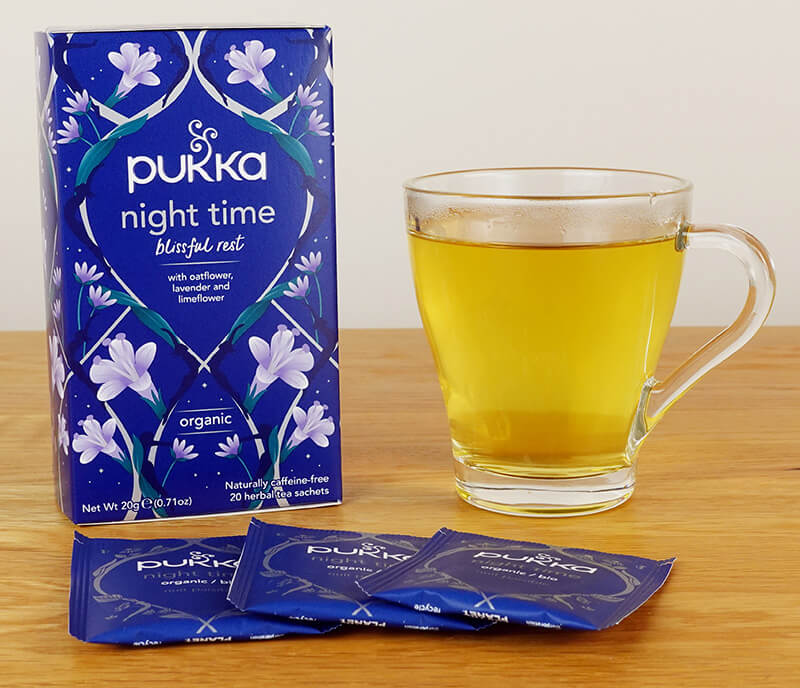
Ingredients
- Oat flowering tops (30%)
- Licorice root
- Chamomile flower
- Lavender flower (14%)
- Lime flower (10%)
- Valerian root (4.9%)
- Tulsi leaf
There are three Pukka teas on my list, but the night time blissful rest is my personal favorite. My partner had it as number three, so we both agreed it’s a lovely sleep tea.
It has a pleasant aroma, without the lavender being overpowering. The same applies to the taste, which is flowery and balanced, with a hint of sweetness. It’s the only one we tried with oat flowering tops, which perhaps contributes to the gentle taste.
We also both agreed that the taste is simply what you’d associate with a sleep tea. Nothing jarring or too strong – just a soothing tea you can sip at bedtime.
You can find it in some supermarkets and health food shops in the UK, on the Pukka website, and on Amazon globally.
2. Yogi Tea Bedtime Ayurvedic Blend
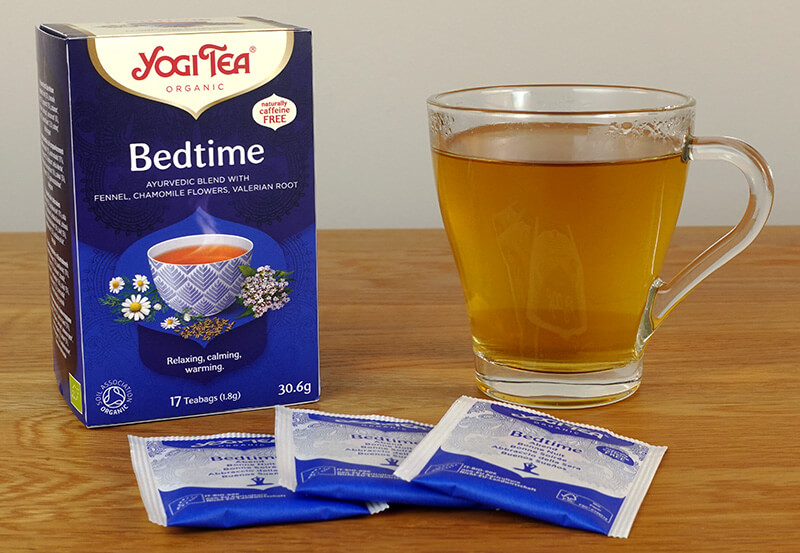
Ingredients
- Fennel (31%)
- Chamomile flowers (17%)
- Peppermint (13%)
- Cardamom
- Lemon balm
- Lemon grass
- Valerian root (6%)
- Sage (5%)
- Lavender flowers (3.5%)
- Nutmeg
With ten herbal ingredients, the taste of the Yogi Bedtime (the Ayuverdic blend version) isn’t overpowered by any of them, which is a good thing in our opinion.
It has a warm, herbal glow that we immediately associated with the thought of a calming drink. In some ways, all of our favorites had this in common: they may have herbal/flowery elements, but are balanced and enjoyable to drink.
The Yogi Tea was one that seemed to get better the longer we kept the teabag in too, with the taste developing nicely rather than becoming too strong.
I bought it on Amazon, but you can also find it on the Yogi Tea website. It may also be sold in some health food shops, such as Holland and Barrett in the UK, and stores like Walmart in the US.
3. Celestial Seasonings Sleepytime Infusion
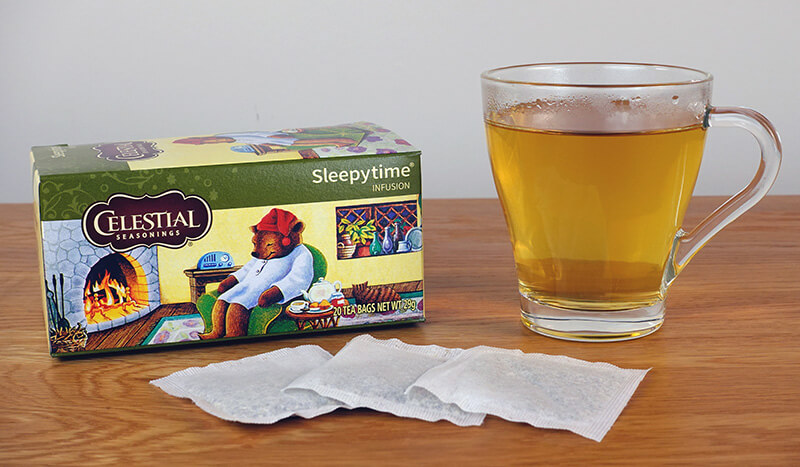
Ingredients
- Chamomile
- Spearmint
- Lemongrass
- Tilia Flowers
- Blackberry Leaves
- Orange Blossoms
- Hawthorn
- Rosebuds
When I asked my partner to describe the taste of the Celestial Seasonings Sleepytime Infusion, her reply was that “It has a rounded palette, with sweet notes.”
After wondering if she’d ever had a job as a wine critic, I realized she was right. Like the previous two, this one works well as a sleep tea because it’s well balanced, with all eight ingredients working in harmony.
The spearmint does just about poke its head through the other flavours, which we both liked. Perhaps it’s also an ideal choice if you’ve overindulged late at night and need some mint to work its digestive magic.
I bought it on Amazon. You can also find it on the Celestial Seasonings website, and in some health food shops around the world.
4. Pukka Night Time Berry
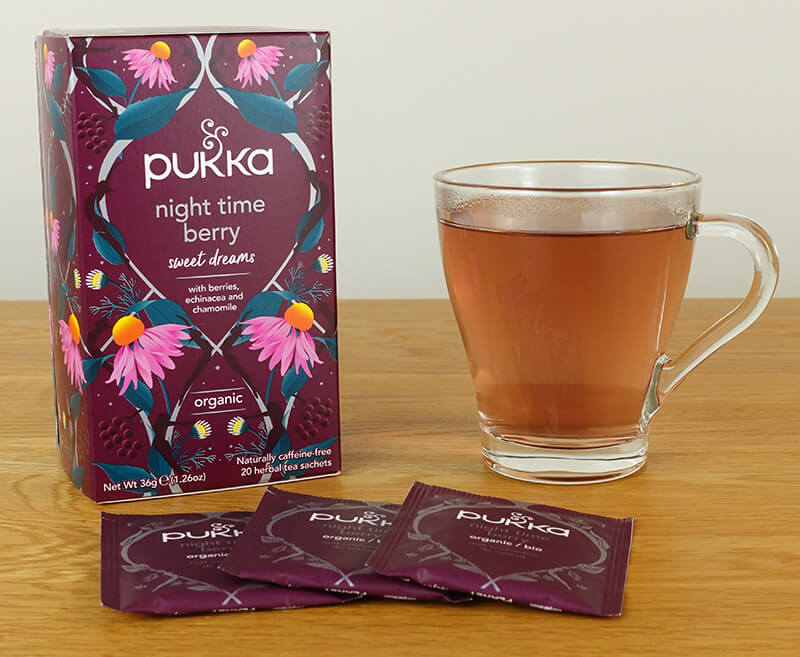
Ingredients
- Rosehip
- Hibiscus Flower
- Chamomile Flower (15%)
- Lavender Flower
- Licorice Root
- Ginger Root
- Echinacea herb (6%)
- Elderberry (4%)
- Blackcurrant Fruit (4%)
- Valerian Root
- Blueberry Flavor
- Blackcurrant Flavor
After I’d finished taking the photos of the brewed teas for this article, I realized they were all yellow/orange with one exception – Pukka Night Time Berry. The Berries in this tea give it a lovely colour, as well as a punchy aroma and taste.
As you’d expect from looking at the ingredients, it has a fruity taste that’s both sweet and slightly sour at once. Along with the berries, perhaps the Echinacea contributes to the interesting blend of sweet and sour. I’m not always a fan of herbal teas with a strong taste of berries, but this one hits the spot nicely.
You can find it in some supermarkets and health food shops in the UK, on the Pukka website, and on Amazon globally.
5. Tick Tock Bedtime
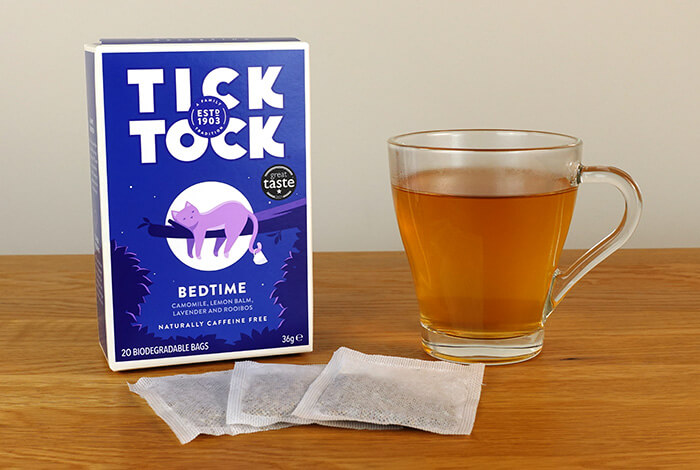
Ingredients
- Camomile (20%)
- Apple
- Rooibos (15%)
- Honeybush
- Lemon Balm (13%)
- Liquorice
- Lavender (3%)
- Aniseed
- Blackberry Leaves
I’m a huge fan of Rooibos tea and often drink it during the daytime, so I was very happy to discover a specific sleep tea with Rooibos included alongside some typical bedtime tea ingredients.
Tick Tock Bedtime has a full-bodied flavor (back to the wine descriptions!), with a herbal aroma and taste that isn’t dominated by any of the nine ingredients. I could detect the Rooibos though, which gave it a warming feel that I found relaxing to sit down and sip.
I bought it in Waitrose in the UK. It’s also on the Tick Tock Tea website, in some health food shops, other supermarkets like Morrisons, and on Amazon.
6. Twinings Sleep Spiced Apple & Vanilla
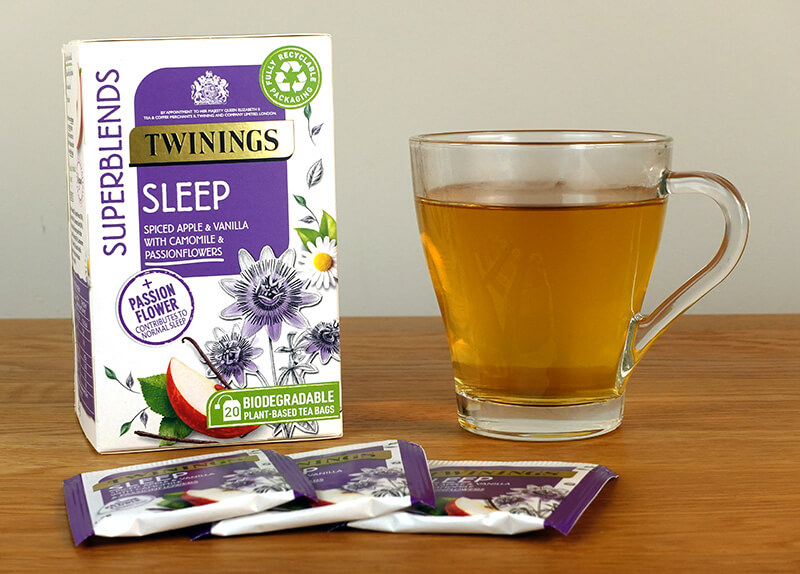
Ingredients
- Passionflower (35%)
- Apple Pieces (15%)
- Camomile (14%)
- Cinnamon Bark (10%)
- Natural apple flavouring with other natural flavourings (10%)
- Cardamom (6%)
- Cloves (6%)
- Natural vanilla flavouring with other natural flavourings (4%)
There are two versions of Twinings Sleep on my list, but we both preferred this one. It has a beautiful vanilla aroma, even though the vanilla is slightly more subtle in the taste. Perhaps that’s because the spiced edge created by the Apple, cardamon, cinnamon, and cloves is so apparent.
Relaxing on the sofa while drinking this tea on a cold night in January just felt right to us. The combination of sweetness and warming spice make it a perfect sleep tea for those long winter nights.
I bought it in Sainsburys supermarket, and it’s also sold in other supermarkets in the UK as it’s a popular bedtime tea. You can also find it on the Twinings website and on Amazon.
7. Pukka Three Chamomile
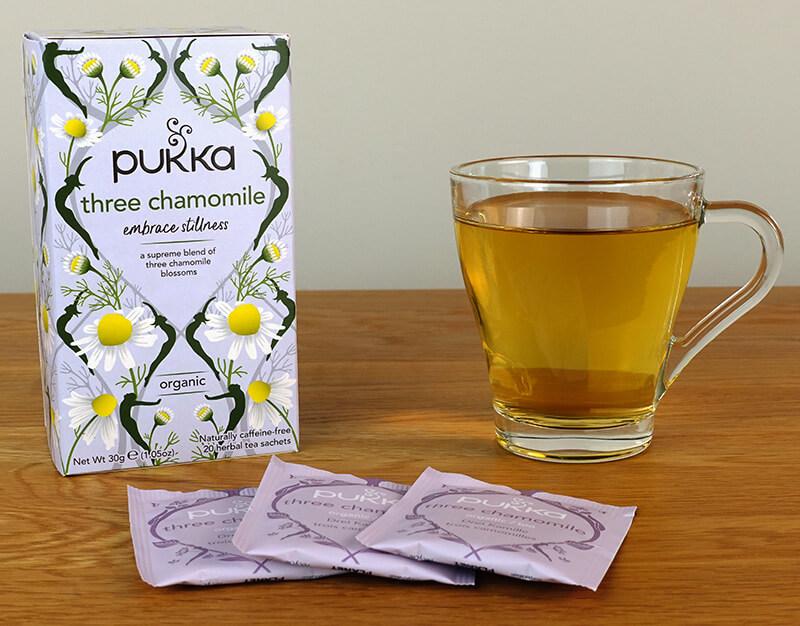
Ingredients
- African chamomile flower (70%)
- Egyptian chamomile flower (20%)
- European chamomile flower (10%)
If you just want a straight up chamomile tea without other ingredients, the Pukka Three Chamomile is the one we recommend.
We’ve both tried various chamomile-only teas over the years, but this one from Pukka stands out for its intense flavor. It’s also interesting that it contains a blend of African, Egyptian, and European chamomile.
There’s not much else to say about it really – it’s just pure chamomile that you’re likely to associate with relaxation if you’re used to drinking chamomile.
You can find it in some supermarkets and health food shops in the UK, on the Pukka website, and on Amazon.
8. Clipper Snore & Peace
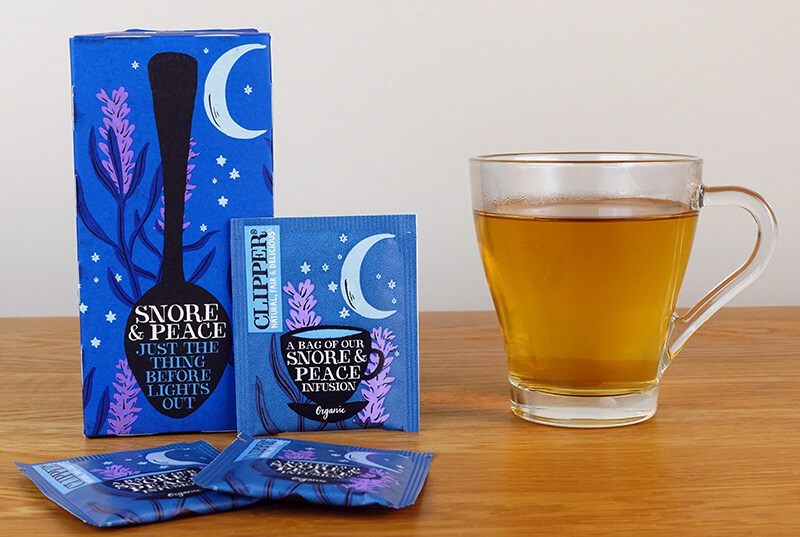
Ingredients
- Chamomile (30%)
- Lemon Balm (15%)
- Lemongrass
- Lavender (14%)
- Fennel seed
- Rosehip
- Spearmint
Clipper Snore & Peace contains a fairly sizeable percentage of lavender (14%), but manages to contain the potentially intense smell and flavor that lavender is known for.
There were a couple of teas that didn’t make this list because of what I call extreme lavenderization (the taste was so strong, I had to invent a word for it).
Snore & Peace definitely has a noticeable lavender taste, so it’s one to consider if you enjoy that. Unexpectedly, we found the lavender aroma and taste is strongest when you first pour the tea, but the other flavors catch up after a few minutes and balance it out.
I bought it in Waitrose in the UK, and it’s sold in some other supermarkets too. You can also find it on the Clipper website and Amazon.
9. Twinings Sleep Valerian & Orange Blossom
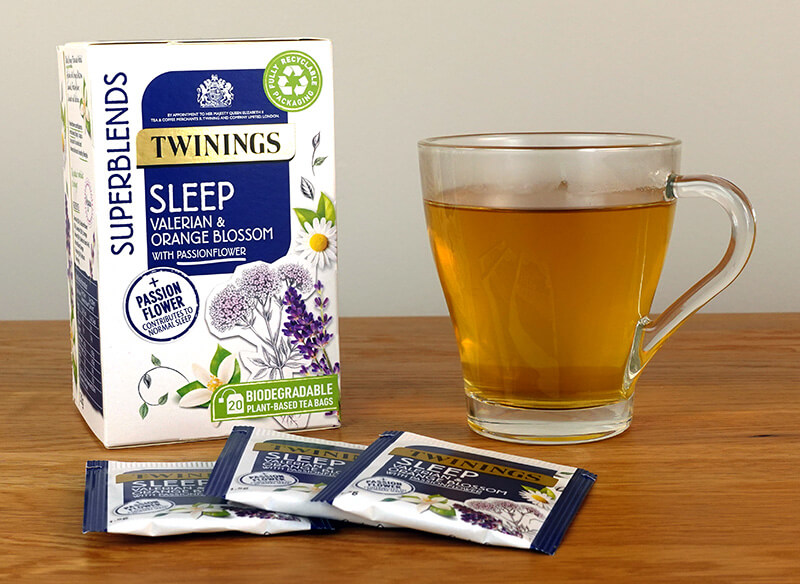
Ingredients
- Camomile (35%)
- Passionflower (35%)
- Lavender (12%)
- Orange Blossom (10%)
- Valerian Root (4%)
- Natural Blood Orange Flavouring (2%)
- Natural Flavouring
In a similar way to lavender, valerian can also dominate the taste of a herbal tea if the manufacturer allows it to. This version of Twinings Sleep manages to contain the two, even though it still has a noticeably herby taste.
The inclusion of orange blossom and orange flavouring perhaps helps counterbalance the overall feel of the tea. It has a curious combination of earthy flavors with a sweet note layered over the top.
We both thought it has a slightly more medicinal taste than the spiced apple and vanilla Twinings Sleep, but still enjoyed drinking it while relaxing before bedtime.
I bought it in Sainsburys supermarket, and it’s also sold in other supermarkets in the UK as it’s a popular bedtime tea. You can also find it on the Twinings website and on Amazon.
10. Dragonfly Tea – Night Sky Calm
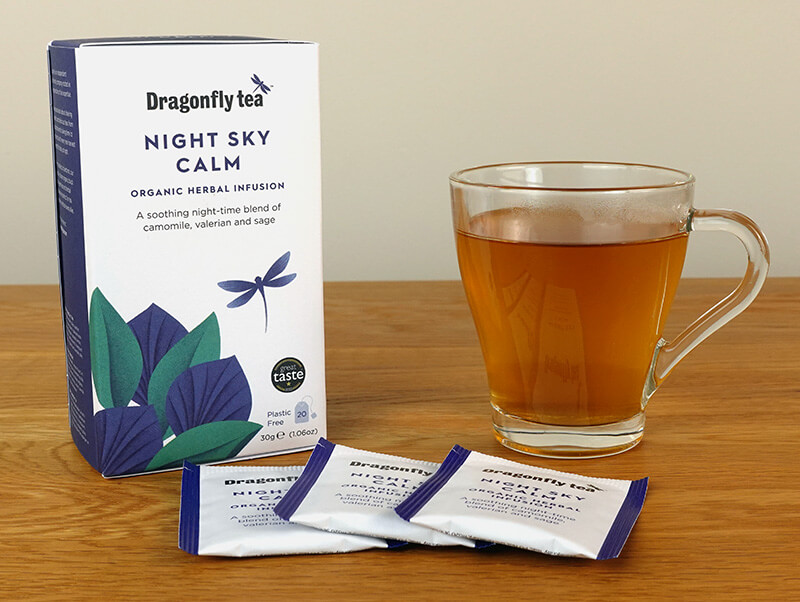
Ingredients
- Camomile
- Lemon balm
- Liquorice
- Honeybush
- Valerian
- Oatstraw
- Lavender
- Sage
Dragonfly Tea Night Sky Calm was one that surprised both of us. It has a kind of medicinal taste when you first sip it, with the valerian and sage coming across quite strongly. But then there’s a kind of sweet aftertaste that lingers in the back of your mouth and throat afterwards.
Some of the other teas have a similar effect, but none as strongly as this one. We couldn’t quite decide which ingredients were responsible for the delicious after taste. Whichever they are, they offset the medicinal side nicely, making it a lovely tea to relax with.
Dragonfly tea also make a couple of excellent mint teas if you’re looking for a digestive tea. And they also make one of my all-time favorite daytime teas, the superb Earl Grey and Rooibos blend.
I bought this one on Amazon. You can also find it in supermarkets and health food shops in the UK and some other countries, as well as the Dragonfly Tea website.
11. Nutra Tea Chamomile & Valerian
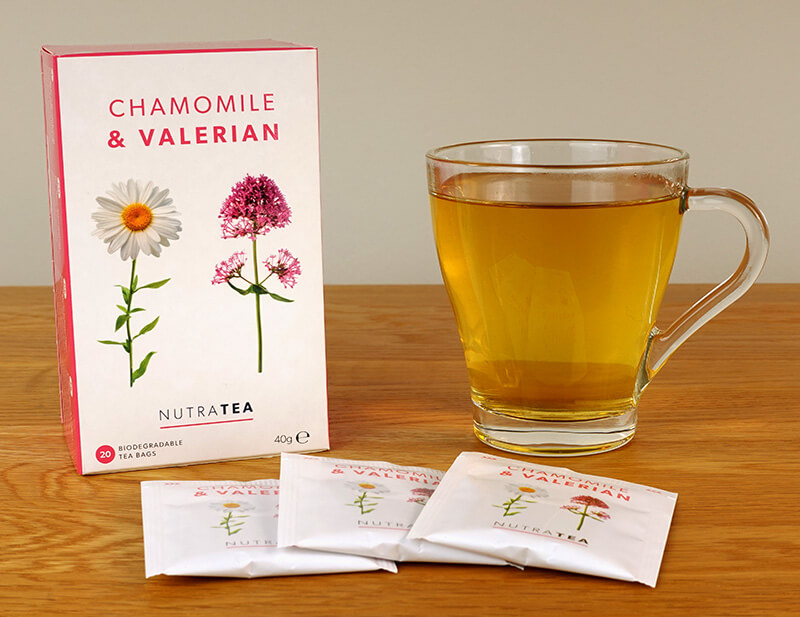
Ingredients
- Chamomile (85%)
- Valerian (15%)
In comparison to most of the other teas I’ve looked at so far, Nutra Tea only contains valerian and chamomile. Both the aroma and taste are therefore predictably strong, with no other ingredients to balance them out.
Personally, I preferred the teas that add a little sweetness, but if you’re a fan of chamomile and valerian, this is one to consider. The mix isn’t quite as strong as in some other chamomile and valerian focused teas I’ve tried, so you can still enjoy the tea without feeling it’s too much.
I bought it on Amazon, and haven’t seen it in any physical shops in the UK. You can find out more about it on the Nutratea website.
12. Teapigs Snooze Sleepy Tea
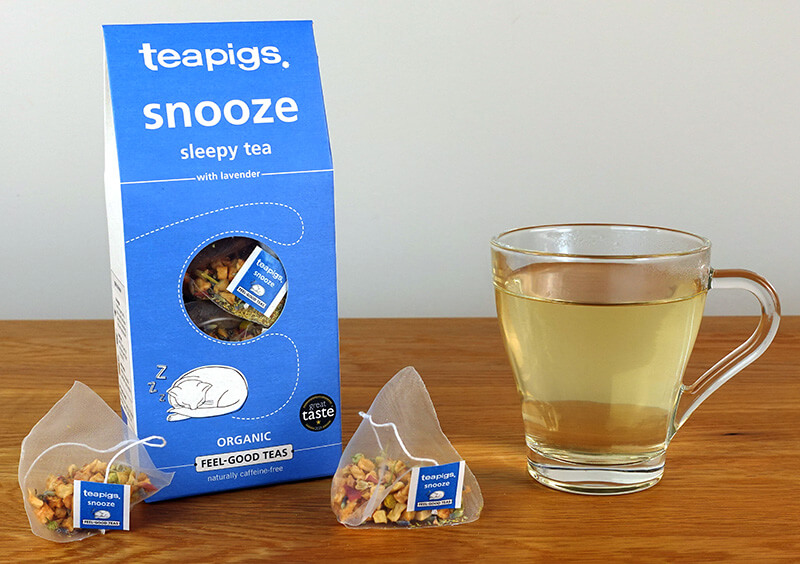
Ingredients
- Organic Apple Pieces (80%)
- Organic Chamomile Flowers (12%)
- Organic Lavender Flowers (8%)
Teapigs Snooze Sleepy Tea ended up in twelfth place only because the lavender was a bit too powerful for my palette. If you associate lavender with relaxation and enjoy the taste though, you may well love this tea.
From the second you pour hot water over the teabag, the unmistakable scent of lavender fills the air. It also contains apple pieces and chamomile, but they fade into the background with so much lavender floating around.
Even though it’s only listed as 8% of the ingredients, I found it provided more like 80% of the taste. So if you find lavender calming and enjoy drinking it at night, this is one to try.
I bought it in Sainsburys in the UK, and you’ll also find it in other supermarkets like Waitrose and Tesco. It’s also available on the Teapigs website and on Amazon.
What evidence is there that tea can help you sleep?
The bottom line is that there hasn’t been enough research into the sedative effects of the herbal ingredients in tea form to draw any firm conclusions. And studies of the ingredients in other forms, with higher quantities than typically found in tea, have found mixed results.
On a more optimistic note for bedtime tea lovers, there’s plenty of support among sleep experts for the idea that intentionally taking some time out to relax before bed can put you in the right frame of mind for sleep.
If drinking your favorite cup of herbal tea in the evening feels relaxing to you, perhaps even forming part of a relaxing bedtime routine, then that may be all the evidence you need.
Having said that, let’s take a look at some of the key ingredients in the herbal tea world. I won’t cover every ingredient listed in the teas above – just the most commonly found ones.
In the photo below, I’m enjoying the best part of my bedtime routine – a relaxing cup of tea and a good book. Bliss!
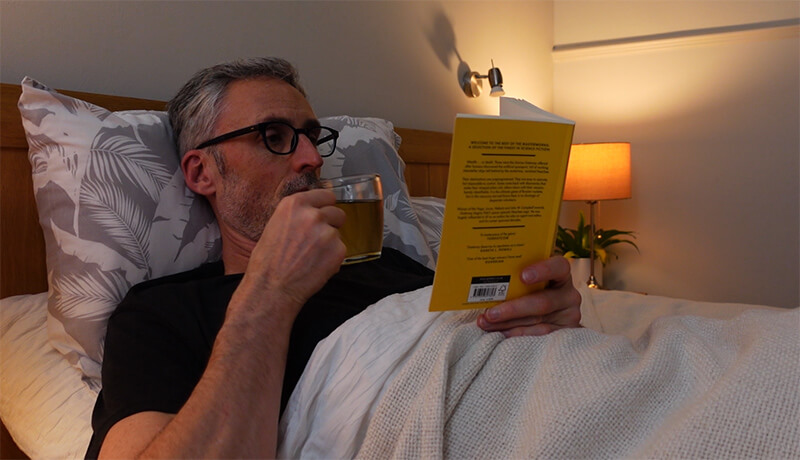
Chamomile
Chamomile is found in many brands of herbal tea, either alone or mixed with other plants. It’s in all twelve of the store bought teas I discussed above!
As for evidence that it works as a sedative, one review study in 2019 found that it helped with sleep quality, but not with the severity of insomnia.
Studies involving chamomile in actual tea form are very limited. One study in 2016 found that it helped postpartum women sleep better. However, after four weeks there was no difference between those and the control group who didn’t drink the tea. So they suggested that “the positive effects of chamomile tea were limited to the immediate term.”
Valerian
People is an ingredient in six of the twelve teas I tried. It’s one of the few plants which have been shown by researchers to help with sleep. However, a detailed review in 2018 of previous clinical trials found that the overall picture was one of inconclusive results.
Other researchers suggest it may work, but the problem is one of the clinical trials not being well designed. I haven’t found any research studies that used valerian tea specifically; they tend to be in larger dose supplement form instead.
Lavender
Although chamomile and valerian have long been two of the stars of bedtime teas, lavender makes an appearance in eight of the twelve teas I tried.
The evidence that lavender helps with sleep is mainly anecdotal though. I haven’t seen any evidence that it helps with sleep when drunk in tea. One review of eight studies using aroma inhalation suggested that it may provide a small to moderate benefit, but that more research is needed.
Interestingly, in a study in 2015, Taiwanese researchers found that lavender tea helped postnatal women feel less fatigued and depressed – but only in the short term compared to a control group.
Lemon balm
Like lavender, lemon balm has plenty of anecdotal evidence suggesting that it helps with anxiety, stress, or insomnia. It’s included in four of the teas on my list.
In a study in 2004, lemon balm was found to be associated with an increase in self-reported feelings of calmness.
One study in 2011 found some positive results when using a concentrated extract. But again, it wasn’t in tea form so the same effect can’t be guaranteed if you drink it – especially if it’s just a small contributor to a tea mix using several ingredients.
Passionflower
The passionflower is stunning when in bloom, alien almost with its complex design. Is the beauty of the flower mirrored in the quality of your beauty sleep though?
There is some research using it in tea form. In the study, 41 participants were given either passionflower tea or a placebo tea. The researchers found that those drinking the real tea had ‘short-term subjective sleep benefits’.
Spearmint and peppermint
In the past, I would only make myself a mint tea if my stomach was bubbling away uncomfortably after eating, but it’s also sometimes included in these herbal teas.
Despite a lack of research using mint in tea form specifically, animal studies have found that peppermint oil can help with indigestion and some other stomach complaints, and work as a muscle relaxant.
And in a study in 2020, using aromatherapy with peppermint was found to improve the sleep of cancer patients.
Teas recommended by previous readers
In the years since I first wrote this article, many readers have shared their favorite teas for sleep. With so many great suggestions, I’ve compiled the list below.
- Yogi soothing bedtime caramel.
- Lemon balm and skullcap combination.
- Chamomile Nights by Stash, with chamomile, spearmint and lotus.
- Chamomile mixed with Chinese tea.
- Lavender sun tea.
- Sleepytime tea mixed with chai white tea and Rooibos red tea.
- Chamomile steeped in hot water along with lemon verbena, with some lemon and sugar added.
- Brewing 10 sweet mint leaves in hot water.
- Sleepytime tea with vanilla.
- Triple Leaf Relaxing Tea (Chinese herbal tea).
- Linden leaves tea.
- Peppermint and chamomile tea combined.
- Tension Tamer.
- Tazo tea.
- Happy Nights tea by Carmencita.
- Nettle tea and Chamomile with a teaspoon of raw honey.
- Teavana’s Winterberry.
- Decaffeinated Earl Grey.
- Nighty Night.
- A concoction of the leaves of guava, taro and mulberry.
- Triple Leaf Relaxing.
- Ahmad Verbena (Vervain).
- Hibiscus tea.
- Dr. Stuart’s relaxation tea.
- David’s tea – Mother’s Little Helper.
- Morpheus from Tin Roof Teas.
- Teepee dreams from the Native American Tea Company.
What’s your favorite tea for sleep?
Which tea do you drink to help you relax as the sun sets and the moon rises? Do you think it has true sedative properties, or is it just the placebo effect working its magic Let me know your thoughts in the comments below.
